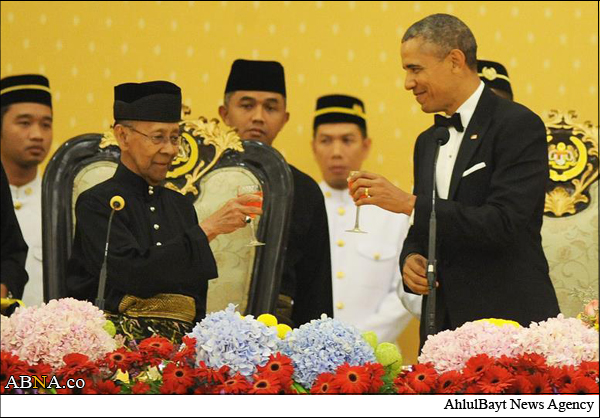President Barack Obama celebrated America’s closer ties with the Muslim-majority nation of Malaysia on Sunday, even as he suggested "there’s more work to be done" here on the issue of human rights.
Obama’s visit - the first by a U.S. president since 1966 - offered Malaysian Prime Minister Najib Razak a chance to show off how much the nation has advanced since President Lyndon Johnson stopped here decades earlier.
"Today, Mr. President, you see not rubber trees, as Lyndon B. Johnson did, but soaring skyscrapers. They are a testament to the transformation that is taking place here in Malaysia," Najib said. "We are a modern, progressive Muslim-majority nation, a multiethnic, multi-religious society."
But even as the two leaders touted deeper cooperation on issues ranging from nuclear nonproliferation to trade - Najib described the two countries’ relationship as "closer now than ever before" - they were pressed to explain how they reconciled Malaysia’s rapid modernization with the repression of political dissent and freedom of expression. Activists complain that Najib’s government has used the sedition laws to sideline its political opponents.
"There’s a recognition by the Malaysian government that more work needs to be done," Obama told reporters, adding he shared with Najib that democratic protections such as "the respect for freedom of assembly, the respect for people of different races and different faiths and different political philosophies - that those values are at the core of who the U.S. is, but also I think are a pretty good gauge of whether a society is going to be successful in the 21st century or not."
Obama even used the example of alleged racist remarks by Los Angeles Clippers owner Donald Sterling as a lesson in the importance of racial and ethnic tolerance for Malaysians as well as Americans. "Like Malaysia, we constantly have to be on guard against racial attitudes that divide us, and instead embrace our diversity as a strength," he said.
Roughly half of Malaysia’s citizens are ethnic Malays, while about 25 percent are Chinese and 7 percent are Indian. Tensions between the country’s different ethnic and religious groups have increased recently for several reasons, including the fact that a 1996 fatwa forbidding the practice of Shiite Islam is being invoked more often and a Malaysian appeals court ruling in October that a Roman Catholic Church newspaper could not use the Arabic word "Allah" to refer to God because that phrase was reserved for Muslims.
Ambiga Sreenevasan, an electoral reform advocate, wrote in an email that the ruling government has used "divisive politics" to stay in power.
"The attacks against the Chinese, the Christian community (in the Allah issue), the constant racist attacks against the minority communities is rising by the day," she wrote.
In a separate event Sunday, during a town hall with young leaders from 10 ASEAN countries, Obama spoke more explicitly about discrimination against minorities as he replied to an online question from a Burmese youth. The president noted that some Muslims in Burma have experienced discrimination, and added, "Then there are times in Malaysia where people who are not Muslims find themselves perhaps being disadvantaged."
Najib defended his regime’s human rights record while echoing Obama’s remarks that "there’s more work to be done."
"President Obama and I are both equally concerned about civil liberties as a principle," he said, adding that he had eliminated detention without trial since taking office in 2009. His task, he said, was to undertake these sort of reforms, but "society has got to be prepared for it, for change, because what is important is the end result. And the end result, as the prime minister, of this country, I’m committed to ensure peace, stability and harmony."








/129

